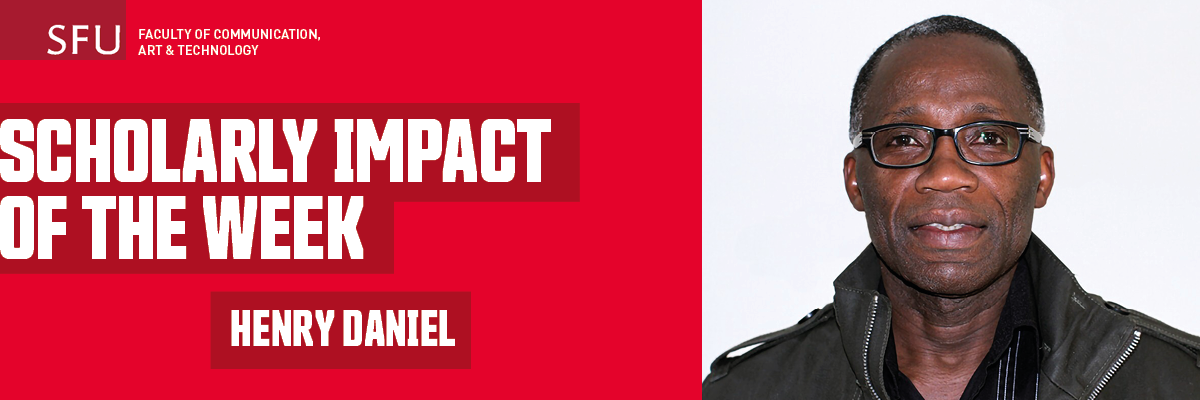
Henry Daniel’s current research project Contemporary Nomads, was inspired while he was working on a previous project in Andalusia, Spain. He was in the town square of Palos de la Frontera – the town where Christopher Columbus launched his first transatlantic expedition - researching Project Barca, an exploration of human discovery, adventure, colonization and of “going west to find east.” By chance, he ended up sharing his table with temporary workers from North Africa and hearing their stories.
It’s not unusual for humans to migrate because they need to work, notes Daniel. It happens all over the world, and even in Canada, which hires seasonal agricultural workers. What struck him was that this part of the world, the gateway to Europe, had been the destination of economic pilgrimage and Islamic occupation for hundreds of years, and how the contribution of Africa to the economic and cultural fabric of Spain was largely underappreciated.
As a native of Trinidad, Daniel was very familiar with the exploits of colonizers such as Spain, England and France. “We were told we were ‘discovered’ by Columbus,” he jokes. Less celebrated, however, is the story of human migration. “I was always interested in why people move. What happens when they get there? What happens if they never get there? What if they want to go back?”
For Daniel, a member of the Black Diaspora, and a professor of dance at SFU, the question of human movement is a personal one on many levels. He began training in dance in the 1970s in Trinidad before moving to the United States to pursue scholarships at two of the world’s leading performing arts schools: the Boston Conservatory of Music and the Juilliard School in New York.
His early experience in dance with the José Limón Dance Company, which approached movement as an instrument to communicate the human experience, inspired his later academic interest in performance research. During his professional career as a dancer, teacher and choreographer, he worked in the USA, Germany and the UK, founding and directing two performance companies as platforms for scholarly artistic exploration.
Daniel joined SFU in 2000 and has since focused his research on strengthening notions of Practice-as-Research, Arts-based Research, and Research/Creation in Canada. In 2020, he was awarded a Research Excellence Award by FCAT and a Distinguished SFU Professorship in 2021 for his tremendous research and service career.
His current research project, Contemporary Nomads, expands upon the work of late cultural theorist Stuart Hall to explore notions of “ground, place, territory [as] the juncture-point where many cultural tributaries meet.” It builds naturally upon the themes of land-place-home he began in Project Barca, and begins with the central questions: How do we define the term Contemporary Nomad? What are the characteristics of such a person?
Nine characteristics were identified including: an incessant curiosity that drives someone to keep searching for answers about their own existence; a sense of belonging nowhere completely but at the same time having parts of one’s identity that are at home in different places; someone who regularly and sometimes even fluidly moves between these systems, institutions or countries; and a desire not to be pinned down, among others.
These research questions and associated characteristics informed the production of the multi-disciplinary performance works nómadas, nómadas_excerpts, and nómadas_the installation, the last a three-channel video/six-channel audio art installation enabling viewers to experience the fragmentation between people, communities and institutions as they migrate across borders.

For the students who took part in the production, it inspired self-inquiry and dialogue into issues of identity, place, language, belonging and conceptions of nationalism, migration, multiculturalism and globalization. The installation featured a poem by student Monserrat Videla:
Where are you from?
I hate that question
If it means ancestry, then yo soy de Colombia y España
If it means where I was born, I am Mexican
If it means where I pay my taxes, my bills, where I see my doctor, I'm from Canada
If it means where I grew up as a child, I'm from Texas
So I never really know how to answer that question
All I know is that home to me doesn't seem like a place to return to
I am envious of those who have found some place to go back to
Right now nowhere is home. (Montserrat Videla, 2017)
“When you hear this poem, it’s something so many people can relate to. Having lived in five countries, I can relate,” says Daniel. “It also answers the research question what is a Contemporary Nomad? Every performer in nomadas was answering that question,” he explains, “and to think this question had ultimately come from a conversation between five men from three different countries sitting around a table at the Plaza Comandante Ramón Franco in Palos de la Frontera, Andalusia.”
Daniel remarks how rewarding it is to engage in these themes with his students. He seeks to empower students to tap into their own ideas and experiences and to express those experiences through movement. By exposing them to arts education and the practice of art as research, he strives for his students to be well informed, confident and articulate, as expert practitioners in their chosen discipline. “We have to be sensitive to the fact that questions of identity and belonging are deeply personal. But I reassure my students that all the material is there, it’s all within them.”
Professor Daniel is wrapping up Contemporary Nomads with a highly anticipated book, (Going West to Find East/Going East to Find West: Re-Choreographing Cortical and Cartographic Maps) due out this fall. He’s preparing for the fall semester at SFU, and following the pandemic, he will be undertaking his next residency at the Federal University of Bahia, Brazil – the next stop in the life of a Contemporary Nomad.
Henry Daniel’s work is funded by an Insight Grant from the Social Sciences and Humanities Research Council of Canada (2017-2021)
SFU's Scholarly Impact of the Week series does not reflect the opinions or viewpoints of the university, but those of the scholars. The timing of articles in the series is chosen weeks or months in advance, based on a published set of criteria. Any correspondence with university or world events at the time of publication is purely coincidental.
For more information, please see SFU's Code of Faculty Ethics and Responsibilities and the statement on academic freedom.